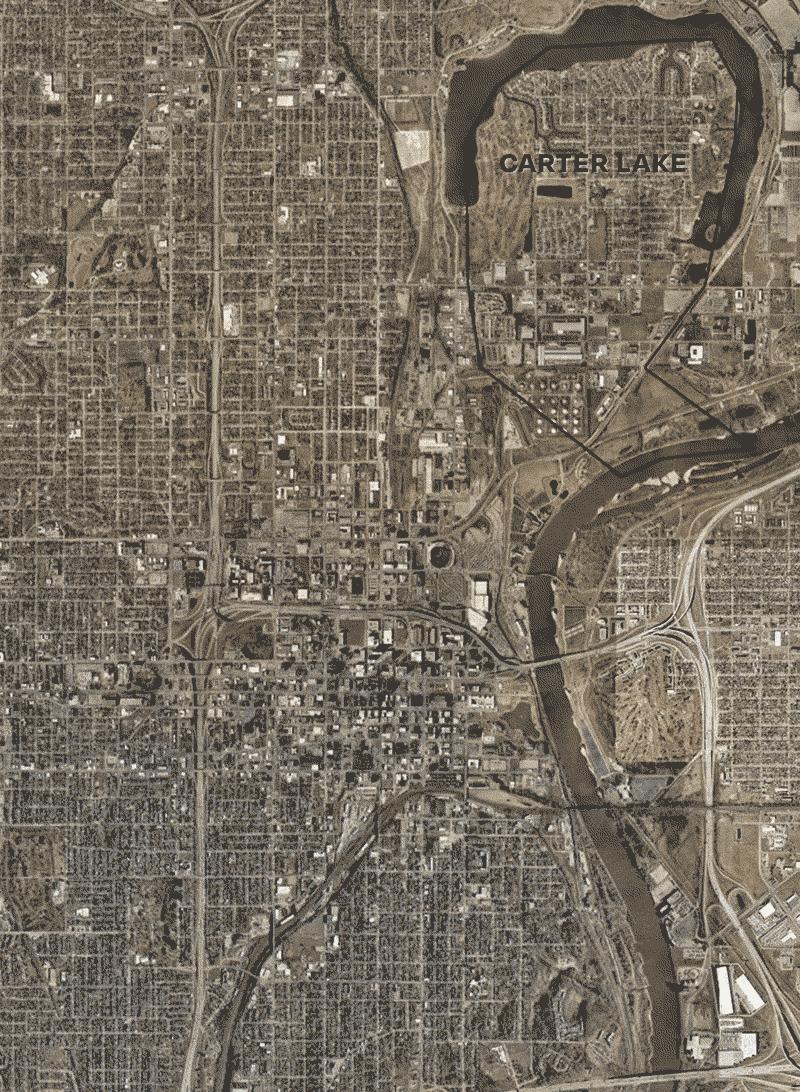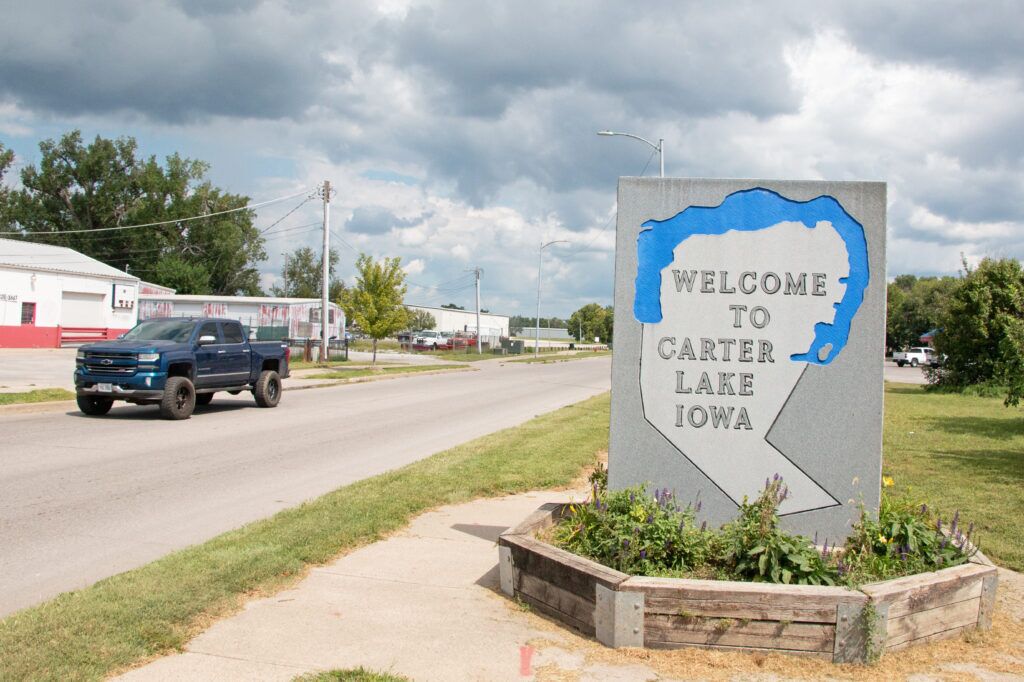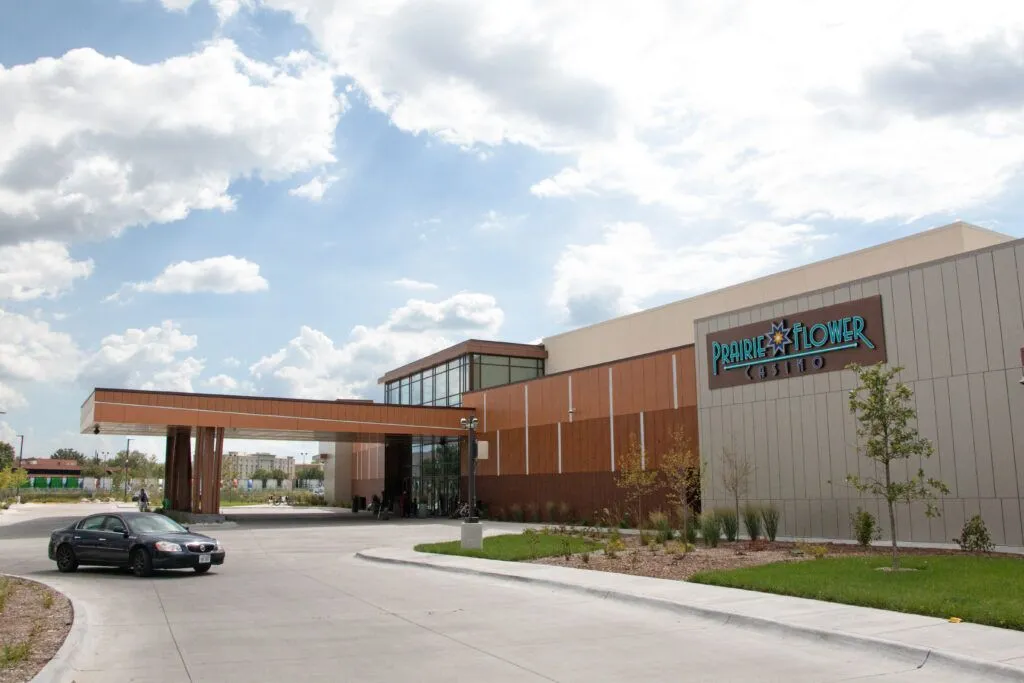
It’s a quintessential Omaha experience: You’re driving to the airport, and all of a sudden, you’re in Iowa. A half-mile later, you’re back in Nebraska.
The well-traversed stretch of road is part of Carter Lake, a geographical oddity created by a course-altering flood along the Missouri River. Once a disputed territory, the Iowa exclave lies at the heart of a historic interstate rivalry pitting Huskers against Hawkeyes.
How did Carter Lake form?
During a cold snap in March 1877, enormous chunks of ice jammed the Missouri River at a sharp bend north of Omaha.
The major flood that ensued carved a new channel for the river, quickly creating a horseshoe-shaped lake along the old bend and severing a 1,200-acre piece of land from the rest of Iowa.
Locals called the new body of water Cut-Off Lake or Lake Nakoma until it was renamed in 1909 to honor Levi Carter, a prominent businessman who founded an Omaha lead plant that caused massive environmental contamination in the area. As Omaha grew, the lake became a hub for sailboating and other genteel water recreation.
The land, known today as the city of Carter Lake, sparked cross-border bickering almost immediately after the flood.

An 1877 article in the Omaha Bee claimed the tract for Nebraska since it now sat west of the Missouri River, historically the legal boundary between the states.
Iowans argued the river’s rerouting didn’t change anything: This land was theirs.
Why is it in Iowa?
Nebraska v. Iowa had two meanings in 1891: the first football game ever played between the states’ top college teams, and the name of a lawsuit contesting ownership of modern-day Carter Lake.
Iowa won on the gridiron, and months later, in the courtroom, too.
The U.S. Supreme Court ruled that since the Missouri River’s channel changed swiftly rather than gradually, the old border remained in place.
The decision solidified the area as a detached fragment of Council Bluffs, but residents voted to secede from the city because they were sick of paying local taxes without receiving public services like fire stations and public schools.
“God took us out of Council Bluffs when the good old Missouri cut us off,” said attorney W.C. Fraser, a namesake partner of the Fraser Stryker law firm, in 1926. “And speaking of cutoffs, that’s what we are. A cut-off territory — cut off for all purposes except paying taxes.”

In 1930, Carter Lake incorporated, becoming the only Iowa municipality west of the Missouri River.
Since then, the city has existed in a gray area between its two bigger neighbors.
Growing up in the 1960s, Keebie Kessler remembers Carter Lake having an Omaha ZIP code despite being part of Iowa. The phone company charged long-distance rates for calls to Council Bluffs, where locals attended high school.
”We’re still the forgotten city,” Kessler said. “We kind of get left out of a lot of things.”
Still, the former Carter Lake councilman said he’s glad the city belongs to Iowa and not Nebraska. Something deep within him identifies with the Hawkeye State, he said.
Why does it matter?
Carter Lake’s unique status as independent and in-between has made it a well-suited host for revelry — or debauchery — depending on who you ask.
In the mid-1900s, the city held a reputation as a hotbed of gambling, prostitution and bootlegging.
Kessler remembers hearing stories about illegal poker games at an infamous Locust Street nightclub called the Shangri-La.

“If the Iowa cops came, they’d move over to the Nebraska side, and if the Nebraska cops came they’d move over to the Iowa side,” Kessler said.
Today, Carter Lake’s gambling scene is above board, though not without controversy.
In 2018, the Ponca Tribe opened a casino in the city, spurring lawsuits from Nebraska, Iowa and Council Bluffs. At the time, Nebraska prohibited most casinos, and state attorneys argued having one physically attached to Omaha would afflict the city with “the negative effects of gambling.”
Carter Lake and the tribe prevailed in court, and the casino recently expanded to include more than 600 slot machines, electronic table games and a new sportsbook.
The Flatwater Free Press is Nebraska’s first independent, nonprofit newsroom focused on investigations and feature stories that matter.
The post Why Is Carter Lake in Iowa? appeared first on The Reader.







